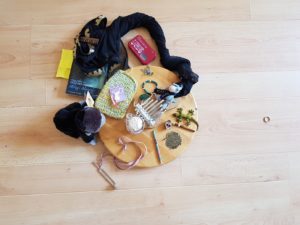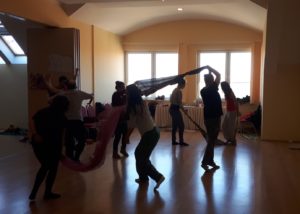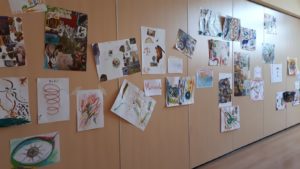Cserkeszőlő is a small laid-back town in Hungary with thermal pools and Hungarian tourists who arrive here to relax and enjoy the wellness opportunities. Running an international training in this setting provided the participants with a setting without distractions, opportunity to become a group and individual chances to reflect on, and learn from what the training addressed.
Unlike the homogenous local setting the group of participants were diverse, coming either from a professional background or being a member of somehow vulnerable groups. The trainers and assistants of IKTE prepared an open process where one could experience the tools of the organisation and reflect on how a group arrives, goes through and learns from non-verbal experiences.
The More than Words project is looking into how vulnerable groups and individuals can be supported. These people often come from a traumatic experience background. As the trainers said ”Our training was mainly focusing on aspects of “identity” and interaction between individuals and the group. Our concept was based on the assumption that in and after critical situations it’s essentially important to strengthen the core and base of the personality, to map personal coping strategies and to support abilities for accommodation to new situations.”
The participants came from more than 10 different nationalities (Hungarian, Polish, German, Turkish, Kurd, Egyptian, Italian, Romanian, English, Nicaraguan, Syrian and French). The nationality in itself would have been an interesting starting point for this training. Also, there were participants without the knowledge of English. As the aim of the project is to see how non-verbal tools can be used, it was a moment to reflect on directly from this experience. “The participants of the training had different cultural and personal backgrounds, different expectations, and had to fit into a completely new situation – in this sense they modelled the target group of the project. But we didn’t pretend they were a marginalized or vulnerable group, we worked with their natural presence and sensibility. The focus was on the individual – how she/he acts in a group, how she/he is influenced by encounters, how she/he communicates through movement and other artistic ways of expression. We structured the training around topics like encounters, dialogue, cooperation and identity.” – explained one of the trainers.
During and after the training participants expressed concerns about the skills and knowledge one should have when working on the physical and emotional level. For IKTE it is not a new aspect to consider. “Working with body can quickly reactivate traumatic experiences, therefore it’s necessary to work step by step, with constant attention to the state of the participants and of the group as a whole. It’s important to inform the participants in advance about the possible intimacy of working with body and draw the attention to paying respect to their own and others’ borders. The work should be slower than it was in our training designed for professionals. This kind of work needs experienced trainers and facilitators. Touch has a powerful healing capacity, but it can also traumatize, so we should handle it very carefully. We have to ask permission to work with touch and have to give always the opportunity to say no to it, or to say stop at any stage of an exercise.” It is clear that it is not a method for all and that it should be used by professionals who are well prepared – also aware of their own borders and limits.
During the 5 intensive days the participants had various moments and activities to harvest their learnings. The program consisted of processes providing situations to experience things and also momentums to reflect, to debrief those – along with professional debates on how this could be or should not be used with different target groups and by different group leaders.
The participants found the topic of group dynamics a relevant one, a lasting debate started about professional ways on how to deal with it, especially when using non-verbal tools. The variety of arts and the connection to movement and body was highly appreciated, seeing opportunities and existing ways for integration. All in all, the training became a reference experience on how sensitive matters may shape a group, a process and how a professional have to be able to hold the situation and support towards learning, growing and healing even if adverse feelings are present.



